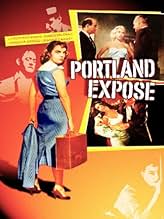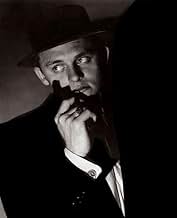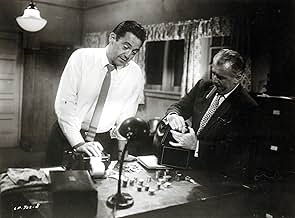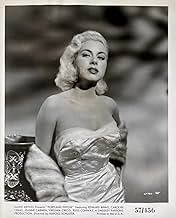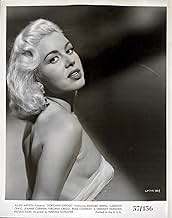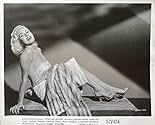A tavern owner in mid-century Portland, Oregon finds the safety of himself and his family threatened when he becomes involved in a war between labor unions and a violent local crime syndicat... Read allA tavern owner in mid-century Portland, Oregon finds the safety of himself and his family threatened when he becomes involved in a war between labor unions and a violent local crime syndicate.A tavern owner in mid-century Portland, Oregon finds the safety of himself and his family threatened when he becomes involved in a war between labor unions and a violent local crime syndicate.
Lawrence Dobkin
- Garnell
- (as Larry Dobkin)
Joseph Marr
- Larry
- (as Joe Marr)
Richard Bellis
- Jimmy Madison
- (as Dickie Bellis)
John Alban
- Tavern Patron
- (uncredited)
Albert Cavens
- Tavern Patron
- (uncredited)
Beulah Christian
- Tavern Patron
- (uncredited)
Francis De Sales
- Alfred Grey
- (uncredited)
Kort Falkenberg
- Speed Bromley
- (uncredited)
Stanley Farrar
- Spud Lennox
- (uncredited)
- Director
- Writer
- All cast & crew
- Production, box office & more at IMDbPro
Featured reviews
"Portland Exposé" follows a tavern owner in Portland, Oregon in the mid-20th-century who finds himself a linchpin to a crime syndicate's gambling racket after installing their pinball machines in his business. His attempts to overthrow them endanger the life of himself and his family.
This low-budget film noir is one of the more slick, gritty, and iron-fisted out there, but it's unfortunately been largely forgotten. It's a B-movie through and through, and while it does suffer some pacing issues and a lack of development, it is at times surprisingly shocking. It depicts rape attempts (including a preemptory one from a teenage girl's boyfriend), and other types of violence that are a bit shocking given the time it was made. It also depicts prostitution in a manner that is frank, reminiscent of how the subject is treated in pre-Code films like "The Story of Temple Drake."
Based on a series of crimes committed by real-life kingpin Jim Elkins, the screenplay never really fleshes out the inner workings of the syndicate or how exactly all of this ties together in the context of the labor unions, and that is probably its biggest trouble. At a quick-paced 72 minutes, there is not sufficient time to elucidate all of this. Where the film makes up for it is in its photography and acting, particularly that of Edward Binns as the tavern proprietor, Virginia Gregg as his concerned wife, and genre favorite Carolyn Craig (probably best known for her role in the original "House on Haunted Hill") as their tormented teenage daughter. All of the acting is surprisingly believable, and the scenarios pack a further punch because of it. The film possesses a borderline-documentary style that recalls 1955's "Kiss Me Deadly," though this film is far less surreal.
All in all, "Portland Exposé" is a solid film noir/thriller that largely succeeds on the basis of its performances and overall tone. It's a dark and gritty film noir, and has a certain kind of bitterness about it that makes it memorable even though it has narrative shortcomings. 7/10.
This low-budget film noir is one of the more slick, gritty, and iron-fisted out there, but it's unfortunately been largely forgotten. It's a B-movie through and through, and while it does suffer some pacing issues and a lack of development, it is at times surprisingly shocking. It depicts rape attempts (including a preemptory one from a teenage girl's boyfriend), and other types of violence that are a bit shocking given the time it was made. It also depicts prostitution in a manner that is frank, reminiscent of how the subject is treated in pre-Code films like "The Story of Temple Drake."
Based on a series of crimes committed by real-life kingpin Jim Elkins, the screenplay never really fleshes out the inner workings of the syndicate or how exactly all of this ties together in the context of the labor unions, and that is probably its biggest trouble. At a quick-paced 72 minutes, there is not sufficient time to elucidate all of this. Where the film makes up for it is in its photography and acting, particularly that of Edward Binns as the tavern proprietor, Virginia Gregg as his concerned wife, and genre favorite Carolyn Craig (probably best known for her role in the original "House on Haunted Hill") as their tormented teenage daughter. All of the acting is surprisingly believable, and the scenarios pack a further punch because of it. The film possesses a borderline-documentary style that recalls 1955's "Kiss Me Deadly," though this film is far less surreal.
All in all, "Portland Exposé" is a solid film noir/thriller that largely succeeds on the basis of its performances and overall tone. It's a dark and gritty film noir, and has a certain kind of bitterness about it that makes it memorable even though it has narrative shortcomings. 7/10.
This is a tough look at the difference between unions and criminally controlled protection. Portland is a peculiar setting for a film noir. It works well, though: The opening narrative begins like a travelogue and gradually shifts into comments on the city's corruption.
The cast is excellent. It's not always the most beautiful looking group. The ingénue, who is pretty, wears her hair slicked back with what looks like Brylcreme. Virginia Gregg, the notable radio actress playing her mother, looks a little old for the role and tired.
It's a twisted movie, though. Catch this: Frank Gorshin, of all people, plays a hit man who is also a pedophile! That's a new one on me -- though child molestation does figure in that great classic of weirdness, film noir, and beauty "The Naked Kiss" a few years later.
The bit players add a lot. There's a scene, just a throwaway, in which a blonde playing a slot machine yells "Jackpot!" and goes into paroxysms of glee as the camera moves away and dumps her.
And the portly older gal imported to Portland to oversee the b-girl business is fabulous. We meet her as she gets off a plane and totters along in her high heels, fur stole wrapped defiantly around her. Her description of her "girls" is priceless: It prefigures the introduction Melanie Griffith provides herself in "Body Double" decades later.
Make no mistake: This is a serious movie. It was obviously done on the cheap. But it's done with great style.
The cast is excellent. It's not always the most beautiful looking group. The ingénue, who is pretty, wears her hair slicked back with what looks like Brylcreme. Virginia Gregg, the notable radio actress playing her mother, looks a little old for the role and tired.
It's a twisted movie, though. Catch this: Frank Gorshin, of all people, plays a hit man who is also a pedophile! That's a new one on me -- though child molestation does figure in that great classic of weirdness, film noir, and beauty "The Naked Kiss" a few years later.
The bit players add a lot. There's a scene, just a throwaway, in which a blonde playing a slot machine yells "Jackpot!" and goes into paroxysms of glee as the camera moves away and dumps her.
And the portly older gal imported to Portland to oversee the b-girl business is fabulous. We meet her as she gets off a plane and totters along in her high heels, fur stole wrapped defiantly around her. Her description of her "girls" is priceless: It prefigures the introduction Melanie Griffith provides herself in "Body Double" decades later.
Make no mistake: This is a serious movie. It was obviously done on the cheap. But it's done with great style.
This film begins with a rather unnecessary and stuffy prologue. Fortunately, despite this weak introduction, the film turns out to be a very, very tough film indeed--with thugs who are child molesters or threaten to throw acid in people's faces. This is NOT your typical 1950s Film Noir movie, but a hard as nails look at organized crime in a rather unexpected locale--Portland, Oregon.
You'll probably notice Virginia Gregg in the female lead. She was seen in 1001 "Dragnet" episodes. Edward Binns, a fine character actor whose name you probably won't recognize plays Gregg's husband--a man who is being forced by the local mob to play ball. Frank Gorshin, in a small but memorable role, plays the rapist who is so vile even the gang is disgusted by him.
As for the plot, it's a very familiar one--having been seen in such earlier films as LOAN SHARK and APPOINTMENT WITH DANGER. An honest guy is sick of the mob, so he agrees to join them in order to get evidence to prosecute them. In this case, Binns pretends to be a rather worldly and not too honest man who is interested in moving up in the organization. However, despite being familiar, the film is handled well and is more than just another time-passer.
You'll probably notice Virginia Gregg in the female lead. She was seen in 1001 "Dragnet" episodes. Edward Binns, a fine character actor whose name you probably won't recognize plays Gregg's husband--a man who is being forced by the local mob to play ball. Frank Gorshin, in a small but memorable role, plays the rapist who is so vile even the gang is disgusted by him.
As for the plot, it's a very familiar one--having been seen in such earlier films as LOAN SHARK and APPOINTMENT WITH DANGER. An honest guy is sick of the mob, so he agrees to join them in order to get evidence to prosecute them. In this case, Binns pretends to be a rather worldly and not too honest man who is interested in moving up in the organization. However, despite being familiar, the film is handled well and is more than just another time-passer.
Based on a "True Story" the opening scene features a panoramic view of Portland as the narration extols
the beauty, culture and incredible atmosphere of the city as a wonderful place to raise a family.
Sounds like Paradise but...it seems the town has been overran by murderous rival crime syndicates vying
for control of the lucrative pinball vending business.
Filmed in a semi-documentary style, Portland Expose reveals the sordid, corrupt side of the City of Roses. The movie follows the plight of local barkeeper George Madison (Edward Binns) as he becomes entangled with the criminal underworld after he agrees to have a pinball machine placed in his tavern. Soon the syndicate forces him to place even more machines and his formerly quiet pub becomes a hangout for the 'wrong crowd'. Regretting his decision Madison decides to fight back after his daughter (Carolyn Craig) is attacked in the parking lot by a syndicate thug (Frank Gorshin). With the cooperation of local officials Madison decides to go undercover to gather evidence to expose the rackets.
The movie draws inspiration from the detective exploitation magazines of the era that promised behind the scenes sordid details. The stories were usually presented in a lascivious manner to maximize sensationalism as they followed the crime investigation through the eyes of the investigators. Tame by today's standards, the film pushed the boundaries into the acceptable content of the time. Though it's a fairly typical 1950's matinee programmer, Portland Exposé weaves a pretty fair noirish tale. Gritty and not highly stylized, it features ensemble cast composed of prolific career character actors (Binns, Virginia Gregg, Russ Conway, Lawrence Dobkin, Frank Gorshin, Rusty Lane, Joe Flynn) who manage to make the movie better than might be expected. All in all a watchable B crime flick.
Filmed in a semi-documentary style, Portland Expose reveals the sordid, corrupt side of the City of Roses. The movie follows the plight of local barkeeper George Madison (Edward Binns) as he becomes entangled with the criminal underworld after he agrees to have a pinball machine placed in his tavern. Soon the syndicate forces him to place even more machines and his formerly quiet pub becomes a hangout for the 'wrong crowd'. Regretting his decision Madison decides to fight back after his daughter (Carolyn Craig) is attacked in the parking lot by a syndicate thug (Frank Gorshin). With the cooperation of local officials Madison decides to go undercover to gather evidence to expose the rackets.
The movie draws inspiration from the detective exploitation magazines of the era that promised behind the scenes sordid details. The stories were usually presented in a lascivious manner to maximize sensationalism as they followed the crime investigation through the eyes of the investigators. Tame by today's standards, the film pushed the boundaries into the acceptable content of the time. Though it's a fairly typical 1950's matinee programmer, Portland Exposé weaves a pretty fair noirish tale. Gritty and not highly stylized, it features ensemble cast composed of prolific career character actors (Binns, Virginia Gregg, Russ Conway, Lawrence Dobkin, Frank Gorshin, Rusty Lane, Joe Flynn) who manage to make the movie better than might be expected. All in all a watchable B crime flick.
Portland Express (1957)
Overall, this is often a stilted affair, and it begins and ends with a canned voice-over about Portland, the Oregon city at the center of this unlikely crime scenario. And for people looking for noir, this is not noir at all, though it does have a kind of throwback to some gangster thugs, and there is a good twenty minutes of night stuff that has a noir look.
Portland Express is more about American innocence, and the surprise anachronism of these mobsters in fedoras pressuring a cute roadhouse into using their pinball machines. Which leads to bigger pressures.
The lead man is a small time movie and later t.v. character, Edward Binns, a solid but unexciting actor, sort of perfect for this solid but unexciting town (back then--now I hear it's solid and exciting). And his daughter is a complete unknown who acts her heart out, and really feels like a teenager on the cusp of womanhood in a realistic way. This matters because she becomes central to the plot, including in a harrowing and almost abusive rape scene (it pushes the violence very hard for a movie of this simplicity). But it's a turning point for Binns, the father, and for the plot, as this likable, ordinary family man goes undercover to get the bad guys.
Naturally, we root for him, and see the dismantling of the syndicate. It gets increasingly dark and desperate over time, and a bit unlikely, but you'll still want to watch to the end, when the cavalry arrives--a group of ordinary men in plaid shirts who rush in to save the day. It's not as hilarious as it sounds. There is a quality of really beautiful, ordinary middle-America here that resonates, and that helps show this is really a 1950s movie. It's widescreen black and white, and a genuine slice of its period.
Overall, this is often a stilted affair, and it begins and ends with a canned voice-over about Portland, the Oregon city at the center of this unlikely crime scenario. And for people looking for noir, this is not noir at all, though it does have a kind of throwback to some gangster thugs, and there is a good twenty minutes of night stuff that has a noir look.
Portland Express is more about American innocence, and the surprise anachronism of these mobsters in fedoras pressuring a cute roadhouse into using their pinball machines. Which leads to bigger pressures.
The lead man is a small time movie and later t.v. character, Edward Binns, a solid but unexciting actor, sort of perfect for this solid but unexciting town (back then--now I hear it's solid and exciting). And his daughter is a complete unknown who acts her heart out, and really feels like a teenager on the cusp of womanhood in a realistic way. This matters because she becomes central to the plot, including in a harrowing and almost abusive rape scene (it pushes the violence very hard for a movie of this simplicity). But it's a turning point for Binns, the father, and for the plot, as this likable, ordinary family man goes undercover to get the bad guys.
Naturally, we root for him, and see the dismantling of the syndicate. It gets increasingly dark and desperate over time, and a bit unlikely, but you'll still want to watch to the end, when the cavalry arrives--a group of ordinary men in plaid shirts who rush in to save the day. It's not as hilarious as it sounds. There is a quality of really beautiful, ordinary middle-America here that resonates, and that helps show this is really a 1950s movie. It's widescreen black and white, and a genuine slice of its period.
Did you know
- TriviaFinal film of Lea Penman.
- ConnectionsFeatured in WatchMojo: Top 10 Movies Banned ONLY in America (2022)
- How long is Portland Exposé?Powered by Alexa
Details
- Release date
- Country of origin
- Official sites
- Language
- Also known as
- Portland Expose
- Filming locations
- Production company
- See more company credits at IMDbPro
- Runtime1 hour 12 minutes
- Color
- Aspect ratio
- 1.85 : 1
Contribute to this page
Suggest an edit or add missing content



